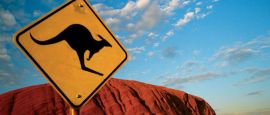Money & duty free for Australia
Exchange rates:
Australian DollarC$1 = A$1.03
€1 = A$1.44
£1 = A$1.71
US$1 = A$1.38
Currency & Money
Australian Dollar (AUD; symbol A$) = 100 cents. Notes are in denominations of A$100, 50, 20, 10 and 5. Coins are in denominations of A$2 and 1, and 50, 20, 10 and 5 cents.
Credit and debit cards are widely accepted throughout Australia. Visa and Mastercard are the most commonly used, while American Express is accepted in many establishments but not all. Contactless payment is standard, and mobile payment services such as Apple Pay and Google Pay are widely used. Smaller shops, cafés or rural businesses may occasionally prefer cash, but this is increasingly rare.
ATMs are widely available in cities, towns and many rural areas. Most machines accept international cards, though withdrawal fees may vary depending on the bank. ATMs operated by the major banks, such as Commonwealth Bank, ANZ, NAB and Westpac, tend to offer the most reliable service. Cash usage is declining in Australia, but carrying a small amount can be useful for markets and remote areas.
There is no limit to the amount of foreign currency that travellers may bring into or out of Australia. However, amounts of A$10,000 or more, or the equivalent in foreign currency, must be declared to Australian Border Force on arrival or departure. This declaration is for anti-money-laundering purposes and does not affect the ability to carry the funds.
Australia duty free
The following items may be brought into Australia by travellers aged 18 or over without incurring customs duty:
• Up to 25 cigarettes or 25g of tobacco products.
• Up to 2.25 litres of alcoholic beverages.
• Personal belongings that you have owned and used for at least 12 months.
• General goods valued at up to A$900 (A$450 for travellers under 18), including gifts, souvenirs, electronics, jewellery, perfume and clothing.
Travellers carrying amounts above these limits must declare the goods and may need to pay duty and taxes. For full details, visit the Australian Border Force website.
Australia has strict biosecurity and customs regulations. Prohibited imports include narcotics, firearms and weapons (unless licensed), counterfeit goods, pornography involving minors, and products made from endangered species. Certain food items, plant material, seeds, live animals and animal products are also banned or heavily restricted. Travellers must declare all risk items on the Incoming Passenger Card; undeclared goods may result in fines or prosecution. This list is not exhaustive. Travellers should consult the Australian Border Force website for the most up-to-date information.
Prohibited exports include illicit drugs, protected wildlife and items made from endangered species, heritage-listed cultural artefacts, and defence or military equipment without the proper permits. Some native plants, animals and biological materials require export approval. This list is not exhaustive. Travellers should check the latest Australian Border Force guidelines before attempting to export restricted items.





 You know where
You know where